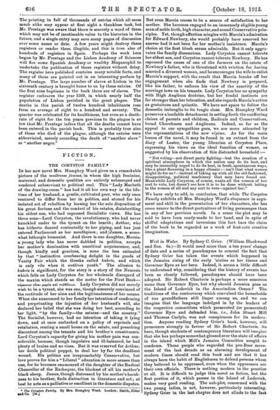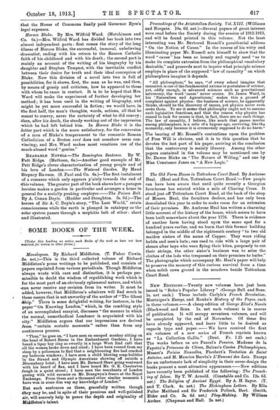Writ in Water. By Sydney C. Grier. (William Blackwood and
Son. 6s.)—It would need more than a ten years' change of date and a series of pseudonyms to conceal the fact that Sydney Grier has taken the events which happened in the Jamaica rising of the early 'sixties as her theme and Governor Eyre as her hero. Indeed, it seems a little difficult to understand why, considering that the history of events has been so closely followed, pseudonyms should have been adopted. Sir Robert Charteris is perhaps a more sonorous name than Governor Eyre, but why should Jamaica pass as the Island of Lodovick in the Amerindian Ocean ? The traditions of the controversy which convulsed the households of our grandfathers still linger among us, and we can imagine that the language indulged in by the leaders of the respective committees which persecuted (or prosecuted) Governor Eyre and defended him, i.e., John Stuart Mill and Thomas Carlyle, was not conspicuous for its modera- tion. Anyone reading Sydney Crier's book, however, will pronounce strongly in favour of Sir Robert Charteris, its hero, though students of contemporary literature will imagine that she has perhaps somewhat glossed over the state of affairs in the island which Mill's Jamaica Committee sought to condemn. Those people who regarded the pro-Boer move- ment of the last decade as an alarming development of modern times should read this book and see that it has always been the habit of Englishmen to defend persons whom they believed to be oppressed, even when the oppressors are their own officials. There is nothing modern in the practice at all. It is difficult to judge this novel as fiction, but the first portion of it, which passes in the Island of Lodovick, makes very good reading. The sub-plot, concerned with the two young ladies, is not, however, particularly interesting. Sydney Grier in the last chapter does not allude to the fact
„that the House of Commons finally paid Governor Eyre's legal expenses.















































 Previous page
Previous page